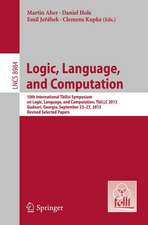Brain-Computer Interfaces: Current Trends and Applications: Intelligent Systems Reference Library, cartea 74
Editat de Aboul Ella Hassanien, Ahmad Taher Azaren Limba Engleză Hardback – 14 noi 2014
The book is basically divided into three parts. The first part of the book covers the basic concepts and overviews of Brain Computer Interface. The second part describes new theoretical developments of BCI systems. The third part covers views on real applications of BCI systems.
| Toate formatele și edițiile | Preț | Express |
|---|---|---|
| Paperback (1) | 652.22 lei 43-57 zile | |
| Springer International Publishing – 10 sep 2016 | 652.22 lei 43-57 zile | |
| Hardback (1) | 658.65 lei 43-57 zile | |
| Springer International Publishing – 14 noi 2014 | 658.65 lei 43-57 zile |
Din seria Intelligent Systems Reference Library
- 20%
 Preț: 1050.57 lei
Preț: 1050.57 lei - 20%
 Preț: 1157.60 lei
Preț: 1157.60 lei - 20%
 Preț: 648.44 lei
Preț: 648.44 lei - 20%
 Preț: 650.08 lei
Preț: 650.08 lei - 20%
 Preț: 1005.64 lei
Preț: 1005.64 lei - 5%
 Preț: 968.88 lei
Preț: 968.88 lei - 20%
 Preț: 1052.67 lei
Preț: 1052.67 lei - 20%
 Preț: 1171.46 lei
Preț: 1171.46 lei - 20%
 Preț: 1164.84 lei
Preț: 1164.84 lei - 20%
 Preț: 815.83 lei
Preț: 815.83 lei - 20%
 Preț: 989.96 lei
Preț: 989.96 lei - 20%
 Preț: 1063.41 lei
Preț: 1063.41 lei - 20%
 Preț: 925.45 lei
Preț: 925.45 lei - 20%
 Preț: 504.37 lei
Preț: 504.37 lei - 18%
 Preț: 1113.26 lei
Preț: 1113.26 lei - 20%
 Preț: 1920.04 lei
Preț: 1920.04 lei - 20%
 Preț: 990.62 lei
Preț: 990.62 lei - 20%
 Preț: 651.57 lei
Preț: 651.57 lei - 20%
 Preț: 645.97 lei
Preț: 645.97 lei - 20%
 Preț: 660.16 lei
Preț: 660.16 lei - 20%
 Preț: 647.13 lei
Preț: 647.13 lei - 20%
 Preț: 654.05 lei
Preț: 654.05 lei - 20%
 Preț: 649.93 lei
Preț: 649.93 lei - 20%
 Preț: 648.11 lei
Preț: 648.11 lei - 20%
 Preț: 657.99 lei
Preț: 657.99 lei - 20%
 Preț: 656.84 lei
Preț: 656.84 lei - 20%
 Preț: 1624.04 lei
Preț: 1624.04 lei - 20%
 Preț: 642.98 lei
Preț: 642.98 lei - 20%
 Preț: 649.60 lei
Preț: 649.60 lei - 20%
 Preț: 651.23 lei
Preț: 651.23 lei - 20%
 Preț: 653.06 lei
Preț: 653.06 lei - 20%
 Preț: 1002.99 lei
Preț: 1002.99 lei - 20%
 Preț: 645.14 lei
Preț: 645.14 lei - 20%
 Preț: 658.33 lei
Preț: 658.33 lei - 20%
 Preț: 644.98 lei
Preț: 644.98 lei - 20%
 Preț: 646.62 lei
Preț: 646.62 lei
Preț: 658.65 lei
Preț vechi: 823.32 lei
-20% Nou
Puncte Express: 988
Preț estimativ în valută:
126.03€ • 131.94$ • 104.28£
126.03€ • 131.94$ • 104.28£
Carte tipărită la comandă
Livrare economică 07-21 aprilie
Preluare comenzi: 021 569.72.76
Specificații
ISBN-13: 9783319109770
ISBN-10: 3319109774
Pagini: 450
Ilustrații: XV, 416 p. 226 illus., 37 illus. in color.
Dimensiuni: 155 x 235 x 29 mm
Greutate: 0.78 kg
Ediția:2015
Editura: Springer International Publishing
Colecția Springer
Seria Intelligent Systems Reference Library
Locul publicării:Cham, Switzerland
ISBN-10: 3319109774
Pagini: 450
Ilustrații: XV, 416 p. 226 illus., 37 illus. in color.
Dimensiuni: 155 x 235 x 29 mm
Greutate: 0.78 kg
Ediția:2015
Editura: Springer International Publishing
Colecția Springer
Seria Intelligent Systems Reference Library
Locul publicării:Cham, Switzerland
Public țintă
ResearchCuprins
General Views on Brain-Computer Interfacing.-New Theoretical Developments.- Views on Applications.
Textul de pe ultima copertă
The success of a BCI system depends as much on the system itself as on the user’s ability to produce distinctive EEG activity. BCI systems can be divided into two groups according to the placement of the electrodes used to detect and measure neurons firing in the brain. These groups are: invasive systems, electrodes are inserted directly into the cortex are used for single cell or multi unit recording, and electrocorticography (EcoG), electrodes are placed on the surface of the cortex (or dura); noninvasive systems, they are placed on the scalp and use electroencephalography (EEG) or magnetoencephalography (MEG) to detect neuron activity.
The book is basically divided into three parts. The first part of the book covers the basic concepts and overviews of Brain Computer Interface. The second part describes new theoretical developments of BCI systems. The third part covers views on real applications of BCI systems.
The book is basically divided into three parts. The first part of the book covers the basic concepts and overviews of Brain Computer Interface. The second part describes new theoretical developments of BCI systems. The third part covers views on real applications of BCI systems.
Caracteristici
Presents current trends and applications in Brain Computer Interface technology Presents novel paradigms for EEG signal recording, advanced methods for processing them, new applications for Brain Computer Interface systems Describes software and hardware packages used for Brain Computer Interface applications Written by experts in the field Includes supplementary material: sn.pub/extras





























